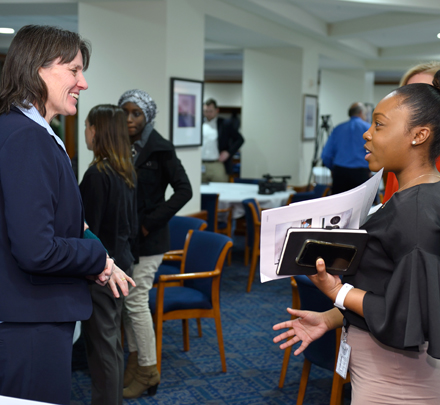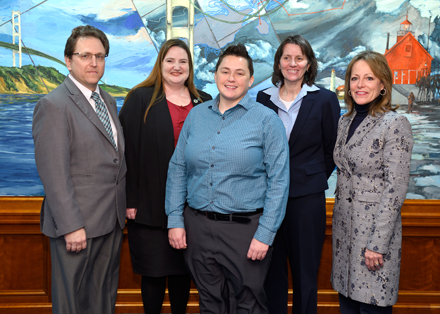The Institute for Public Policy and Social Research held a policy forum focused on Michigan’s double crisis of opioid overdose and suicide. The Public Policy Forum took place on January 16, 2019.
See the presentations, and links to the photos, from this IPPSR Public Policy Forum.
Watch the video from the January IPPSR Public Policy Forum.
Jennifer E. Johnson, PhD, C.S Mott Endowed Professor of Public Health with Michigan State University spoke about the importance of understanding issues elevating the crisis in Michigan. Johnson highlighted suicide as the tenth leading cause of death in the United States with an average of 129 suicides per day. Further, rates are highest in middle ages, especially for white males. Those who thought about suicide for less than a minute before attempting were at 70 percent, and 24 percent thought about suicide for less than five minutes. Johnson mentioned these statistics to explain what policies can be implemented to combat the impulse. She suggested firearm laws, bridge barriers, mandating nurses and care providers are trained in suicide assessment and risk management,  and training for school personnel. These policies allow adequate time and space for the impulse to pass. Moreover, Johnson discussed the 73,000 drug overdoses in the United States last year. A major component in alleviating drug overdoses is the criminal justice system. The justice system is the largest point of contact with individuals at risk with 10 percent of suicides occurring after a criminal or legal stressor and 20 percent of people with substance disorders being justice involved. Johnson concluded by mentioning goals aimed to help with Michigan’s double crisis. Reducing incarceration rates by 25 to 50 percent in Michigan in 10 years, sentencing reforms, and treating addicts in communities rather than in custody will help reduce the crisis in Michigan.
and training for school personnel. These policies allow adequate time and space for the impulse to pass. Moreover, Johnson discussed the 73,000 drug overdoses in the United States last year. A major component in alleviating drug overdoses is the criminal justice system. The justice system is the largest point of contact with individuals at risk with 10 percent of suicides occurring after a criminal or legal stressor and 20 percent of people with substance disorders being justice involved. Johnson concluded by mentioning goals aimed to help with Michigan’s double crisis. Reducing incarceration rates by 25 to 50 percent in Michigan in 10 years, sentencing reforms, and treating addicts in communities rather than in custody will help reduce the crisis in Michigan.
See photos from this IPPSR Public Policy Forum.
Juli Liebler, PhD, Assistant Professor and Director of Outreach with Michigan State University School of Criminal Justice spoke in depth about the challenges of policing. The economic burden of the opioid crisis is carried by criminal justice agencies. However, funding for these agencies has been limited, especially for narcotic officers. Liebler highlighted the cost of the crisis from 2013-2017 as it rose from $78.5 billion to $504 billion. Liebler suggested Michigan take up legislation to allow wiretapping for local police officers to help catch criminals trafficking drugs. Further, Michigan has had some law changes regarding the crisis such as revising the Michigan Automated Prescription System (MAPS). Liebler said the changes reviewed patient subscription histories for more than a three-day supply, limited prescriptions to a seven day supply within a seven day period for acute pain and upgraded to a computer tracking system. Liebler closed with suggestions like funding for state agencies and requiring counseling or rehabilitation for recipients of overdose-reversal drugs such as naloxone.
Courtney Cuthbertson, PhD., community behavioral health specialist for Michigan State University Extension, spoke about opioid use and suicide prevention in communities. Cuthbertson said misuse, overdose and death from synthetic, natural semisynthetic opioids and heroin has increased in Michigan and the United States. Cuthbertson highlighted MSU Extension’s efforts to combat this growing crisis such as Chronic Pain Self-Management programs and the Wellness Initiative for Senior Education. She also explained her work in communities and said that neighborhoods want more education among youth, access to professional treatments and overall more support for loved ones in crisis.
 Transportation issues in these communities should be addressed, Cuthbertson explained, and overdose-reversing drugs need to be more available. She also highlighted the rise in suicides saying one in four adults have been diagnosed with depression and one in three high school students have reported feeling sad or hopeless for two or more weeks. One in five have considered suicide. Cuthbertson concluded by encouraging related education and awareness in communities. She stated neighborhoods want to reduce suicides and want more education on how to help.
Transportation issues in these communities should be addressed, Cuthbertson explained, and overdose-reversing drugs need to be more available. She also highlighted the rise in suicides saying one in four adults have been diagnosed with depression and one in three high school students have reported feeling sad or hopeless for two or more weeks. One in five have considered suicide. Cuthbertson concluded by encouraging related education and awareness in communities. She stated neighborhoods want to reduce suicides and want more education on how to help.
For free and confidential support and crisis resources the National Suicide Prevention Lifeline is: 1-800-273-8255.
Hannah Sweeney is an IPPSR Graduate Fellow pursuing a Masters in Public Policy at Michigan State University.



